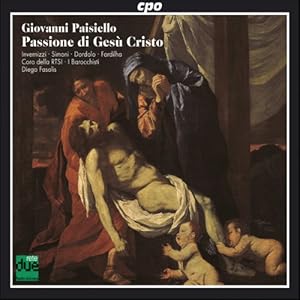Of all the eras of music, the so-called "Classical Era"... the period of Gluck, Haydn, Mozart, and early Beethoven is perhaps the era of which I am the most ignorant. I have a good grasp of the Baroque by now. I could easily rattle off several dozen names that I consider "essential listening." I could say the same of Romanticism, Early Modernism... even late Modernism and/or music post-1950. Hell, I probably have a wider variety of composers in my collection of the Medieval and Renaissance periods. But my grasp of the Classical Era is admittedly lean pickin's beyond the big boys (Mozart, Haydn, etc...)
So here, as with the sister thread on the Baroque, I thought I'd offer up a place where we might discuss our favorite composers of the Classical era... as well as our recent discoveries or admired composers that we feel others might just be unaware of... and yet may enjoy.
Currently one Classical Era composer that I am exploring is Giovanni Paisiello. He was a composer credited with having composed nearly 100 operas... including the first setting of Il barbiere di Siviglia... yet now almost none of his operas are known at all. This is being slowly addressed as various ensembles turn away from yet still another recording of the same well-known piece. Currently I am listening to this:
![Image]()
While the work is a sacred oratorio... or rather a "passion"... it is quite operatic in nature. The music exhibits something of the delicious elegance that I have come to expect of Italian music. Indeed, in some ways I think of Handel's early Italian cantatas... albeit stripped down even further of their frills and trills and offering an even greater "transparency". The choruses are quite simple... lovely... and elegant. Surely a composer I must explore more.
So here, as with the sister thread on the Baroque, I thought I'd offer up a place where we might discuss our favorite composers of the Classical era... as well as our recent discoveries or admired composers that we feel others might just be unaware of... and yet may enjoy.
Currently one Classical Era composer that I am exploring is Giovanni Paisiello. He was a composer credited with having composed nearly 100 operas... including the first setting of Il barbiere di Siviglia... yet now almost none of his operas are known at all. This is being slowly addressed as various ensembles turn away from yet still another recording of the same well-known piece. Currently I am listening to this:

While the work is a sacred oratorio... or rather a "passion"... it is quite operatic in nature. The music exhibits something of the delicious elegance that I have come to expect of Italian music. Indeed, in some ways I think of Handel's early Italian cantatas... albeit stripped down even further of their frills and trills and offering an even greater "transparency". The choruses are quite simple... lovely... and elegant. Surely a composer I must explore more.







